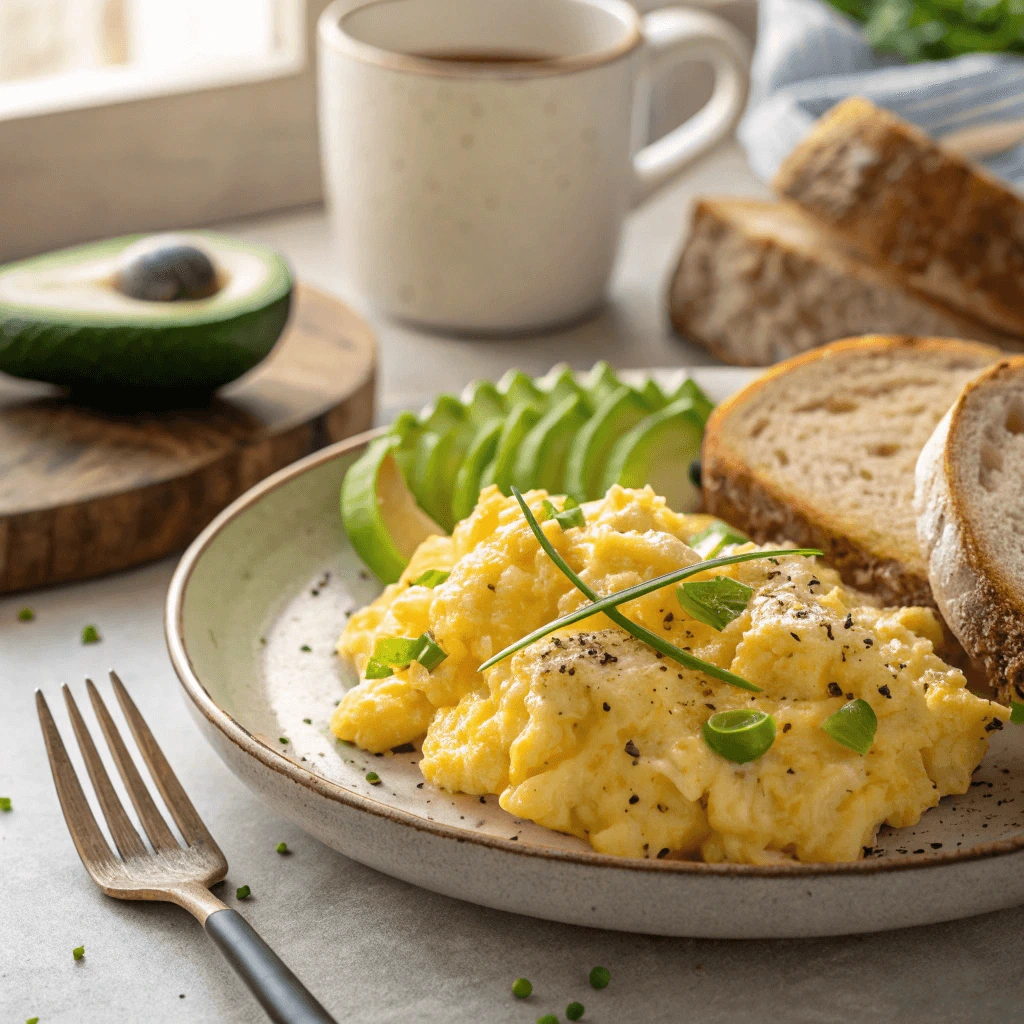Introduction: A Delicious & Nutritious Way to Start Your Day
Mornings can be hectic, and finding a breakfast that is both healthy and easy to prepare can feel like a challenge. Whether you’re rushing to work, preparing for a workout, or simply looking for a satisfying way to start your day, cottage cheese eggs offer the perfect balance of protein, flavor, and simplicity.
Imagine waking up to a warm, fluffy plate of eggs infused with the creamy richness of cottage cheese—melting in your mouth with every bite. Not only does this combination create a delicious texture, but it also delivers a powerhouse of nutrients that will keep you energized for hours. Unlike sugary cereals or carb-heavy pastries that can leave you feeling sluggish, this meal provides long-lasting energy and essential proteins to fuel your morning.
The best part? You don’t need to be a professional chef to master this recipe. With just a few simple ingredients and five easy steps, even absolute beginners can create a restaurant-quality breakfast in under 10 minutes. Plus, this dish is incredibly versatile—you can customize it with your favorite herbs, spices, or vegetables for a new twist every time.
In this guide, I’ll walk you through how to cook cottage cheese eggs step-by-step, ensuring that your eggs turn out perfectly creamy, fluffy, and full of flavor. Get ready to transform your mornings with a delicious, nutritious, and foolproof breakfast recipe!
Table of Contents
Why You Should Try Cottage Cheese Eggs
If you’re looking for a nutritious, protein-packed, and easy-to-make breakfast, cottage cheese eggs should be at the top of your list! This simple yet flavorful dish is not only incredibly delicious, but it also offers numerous health benefits, making it an ideal choice for anyone looking to start their day on the right foot.
Whether you’re trying to lose weight, build muscle, or simply eat healthier, cottage cheese eggs provide the perfect balance of protein, healthy fats, and essential nutrients. Here’s why this dish deserves a spot in your regular breakfast routine:
1. High in Protein & Keeps You Full Longer
Cottage cheese eggs are an excellent source of protein, which helps keep you full and satisfied for hours. This makes them a great option if you’re trying to:
- Avoid mid-morning hunger cravings.
- Maintain steady energy levels throughout the day.
- Support muscle growth and recovery, especially after a workout.
A serving of cottage cheese eggs can provide over 20 grams of protein, making it a far better choice than carb-heavy breakfasts like toast, cereal, or pastries.
2. Low in Carbs & Perfect for Weight Loss
If you’re following a low-carb, keto, or high-protein diet, cottage cheese eggs are an ideal breakfast option. Unlike traditional breakfast foods like pancakes or oatmeal, this dish is:
- Low in carbohydrates (helps maintain stable blood sugar levels).
- High in healthy fats and protein (keeps you feeling satisfied longer).
- Great for weight management, as protein-rich foods reduce appetite and prevent overeating later in the day.
By incorporating cottage cheese eggs into your diet, you can fuel your body with essential nutrients without unnecessary sugars or refined carbs.
3. Super Quick & Easy to Make
One of the best things about cottage cheese eggs is how fast and effortless they are to prepare. In just 5 simple steps and under 10 minutes, you can have a hot, satisfying, and nutritious meal ready to enjoy.
Perfect for:
- Busy mornings when you don’t have much time to cook.
- Beginner cooks who want an easy, foolproof recipe.
- Meal prep – you can make a batch and reheat it for a quick protein boost later.
No complicated techniques or special kitchen skills are needed—just whisk, cook, and enjoy!
4. Creamy, Flavorful & Easy to Customize
If you’ve never tried cottage cheese eggs, you’re in for a pleasant surprise! The addition of cottage cheese makes the eggs:
🥚 Creamier and more flavorful than traditional scrambled eggs.
🥚 Softer and fluffier due to the moisture in cottage cheese.
🥚 Slightly tangy, which enhances the overall taste.
Plus, cottage cheese eggs are incredibly versatile. You can customize them with:
- Fresh herbs (chives, parsley, dill).
- Veggies (spinach, tomatoes, mushrooms).
- Spices (paprika, garlic powder, red pepper flakes).
- Cheese toppings (cheddar, feta, parmesan).
There’s no wrong way to make cottage cheese eggs—get creative and enjoy them the way you like best!
5. Packed with Essential Nutrients
Beyond being high in protein, cottage cheese eggs provide a range of important vitamins and minerals that support overall health, including:
| Nutrient | Benefit |
|---|---|
| Calcium | Supports strong bones & teeth |
| Vitamin B12 | Boosts energy & supports brain health |
| Selenium | Acts as a powerful antioxidant |
| Choline | Essential for brain function & metabolism |
| Healthy Fats | Supports heart health & hormone balance |
This makes cottage cheese eggs a nutrient-dense breakfast that fuels your body with everything it needs to start the day strong.
Step-by-Step Guide to Cooking Cottage Cheese Eggs
Cooking cottage cheese eggs is incredibly simple, but to get the perfect fluffy texture and creamy taste, you need to follow a few key steps. Whether you’re a complete beginner in the kitchen or someone looking to try a new twist on classic scrambled eggs, this guide will walk you through the process effortlessly.
By following these five easy steps, you’ll be able to make a high-protein, low-carb breakfast in under 10 minutes!

Step 1: Gather Your Ingredients & Tools
Before you start cooking, it’s important to have everything ready. This will make the cooking process smoother and more enjoyable.
Ingredients You’ll Need:
| Ingredient | Quantity | Why It’s Needed |
|---|---|---|
| Eggs | 2 large | The base of the dish, providing protein & structure |
| Cottage Cheese | ¼ cup | Adds creaminess, protein, and a subtle tangy flavor |
| Butter or Olive Oil | 1 tsp | Prevents sticking & adds richness |
| Salt & Black Pepper | To taste | Enhances flavor |
| Chopped Herbs (Optional) | 1 tbsp | Adds freshness & a burst of color |
Tools Required:
- Mixing bowl – For whisking the eggs and cottage cheese together.
- Whisk or fork – Helps incorporate air, making the eggs fluffier.
- Non-stick frying pan – Prevents eggs from sticking and burning.
- Spatula – Makes stirring and folding the eggs easier.
Step 2: Whisk the Eggs & Cottage Cheese Together
Now that you have your ingredients and tools ready, it’s time to prepare the egg mixture.
- Crack the eggs into a mixing bowl, ensuring there are no shell pieces.
- Add the cottage cheese to the eggs. Make sure to use small curd cottage cheese for a smoother texture. If you prefer a creamier consistency, you can blend the cottage cheese first.
- Whisk the mixture well using a fork or a whisk. You should mix until the eggs and cottage cheese are well combined, creating a slightly frothy and uniform mixture.
- Pro Tip: The more air you incorporate while whisking, the fluffier your scrambled eggs will be!
Step 3: Heat Your Pan Properly
Cooking eggs requires controlled heat to avoid overcooking. Here’s how to get your pan ready:
- Place a non-stick pan on the stove over medium-low heat.
- Add butter or olive oil to the pan and allow it to melt evenly.
- Swirl the pan to coat the bottom, ensuring the eggs won’t stick.
- Why is this important? Cooking on low to medium-low heat ensures that the eggs cook gently, preventing them from turning rubbery.
Step 4: Cook the Eggs Slowly
- Pour the egg mixture into the heated pan.
- Allow it to sit undisturbed for 20–30 seconds so the edges begin to set.
- Using a spatula, gently stir the eggs, pushing the cooked portions from the edges to the center. This creates soft, creamy curds.
- Continue stirring occasionally, ensuring that the eggs cook evenly.
- Pro Tip: Avoid over-stirring—this helps maintain a fluffy texture instead of breaking the eggs into tiny pieces.
- Cook for about 2–3 minutes, or until the eggs are just set but still soft and slightly creamy.
Step 5: Season & Serve
- Once the eggs are cooked but still slightly soft, remove the pan from heat. The residual heat will continue to cook the eggs slightly, ensuring they remain moist and fluffy.
- Season with salt and pepper to taste.
- Garnish with fresh herbs like chives, parsley, or dill for added flavor.
- Serve immediately while warm and enjoy your perfectly creamy cottage cheese eggs!
Tips & Variations for Perfect Cottage Cheese Eggs
Making cottage cheese eggs is easy, but these simple tips and variations will help you get the best texture and flavor every time.
Top Tips for the Best Cottage Cheese Eggs
- Use full-fat cottage cheese for a rich, creamy texture.
- Whisk well to evenly mix the eggs and cottage cheese.
- Cook on low heat to keep eggs soft and fluffy.
- Remove from heat slightly early to prevent overcooking.
- Season after cooking to avoid watery eggs.
Delicious Variations to Try
- Cheesy: Add shredded cheddar, parmesan, or feta for extra flavor.
- Spicy: Mix in red pepper flakes, hot sauce, or jalapeños.
- Herb-Infused: Try chives, parsley, basil, or oregano.
- High-Protein: Add cooked chicken, turkey, or black beans.
- Veggie-Packed: Stir in spinach, mushrooms, or bell peppers.
- Keto-Friendly: Cook in butter and serve with avocado or bacon.
- Mediterranean-Style: Add feta, tomatoes, olives, and a dash of oregano.
Meal Prep Tip
Cook a batch and store in an airtight container for up to 2 days. Reheat gently in a pan or microwave for a quick, protein-packed meal.
Try these variations and make cottage cheese eggs your new favorite breakfast!


Conclusion: Why Cottage Cheese Eggs Deserve a Spot in Your Breakfast Routine
If you’re looking for a quick, nutritious, and delicious way to start your day, cottage cheese eggs are the perfect choice. With their high protein content, creamy texture, and endless customization options, they offer a healthy and satisfying alternative to traditional scrambled eggs.
By incorporating cottage cheese eggs into your breakfast routine, you’ll enjoy:
- More protein to keep you full and energized.
- A creamy, fluffy texture that’s richer than regular eggs.
- Easy preparation in just a few simple steps.
- Endless variations to suit your taste and dietary needs.
Whether you’re following a high-protein, low-carb, or balanced diet, cottage cheese eggs are a versatile, delicious, and healthy meal that anyone can enjoy. Plus, they’re easy to make, meal prep-friendly, and completely customizable—so you’ll never get bored!
Now it’s time to give cottage cheese eggs a try. Experiment with different ingredients, seasonings, and toppings to find your favorite version. Once you taste their creamy, fluffy goodness, you’ll never go back to plain scrambled eggs again!
Have you tried cottage cheese eggs? Let us know your favorite variation in the comments!
FAQs: Everything You Need to Know About Cottage Cheese Eggs
1. Can I use low-fat cottage cheese?
Yes! Low-fat cottage cheese works just as well and keeps the dish lighter.
2. How do I store leftovers?
Keep them in an airtight container in the fridge for up to 2 days.
3. Can I microwave cottage cheese eggs?
Yes, but cook in short 15-second bursts, stirring in between to avoid overcooking.
4. What’s the best way to make them fluffier?
Use room-temperature eggs and whisk well before cooking.

